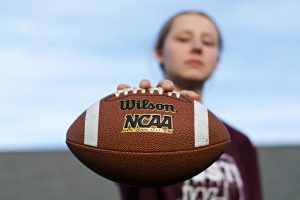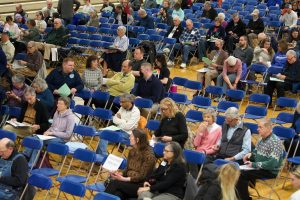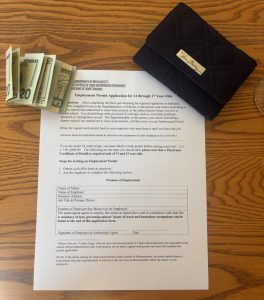District considers later start times to address lack of sleep
Students often stay up until the early hours of the morning finishing homework.
January 20, 2019
Superintendent Everett Olsen has proposed a later start time for all students in the district, with the intention of allowing high school and middle school students in particular to maintain a healthier sleep schedule. The proposal entails moving the start time from 7:35 to 8:00, which would change the final bell from 1:55 to 2:20. The proposal was made by Assistant Superintendent of Curriculum and Instruction Kerry Clery at the School Committee meeting on Dec. 3. No decisions were made.
“Research studies have shown that sleep significantly contributes to several important cognitive, emotional, and performance-related functions,” Clery said during the School Committee meeting on Dec. 3.
This proposal was made based on several factors. Students at Westford Academy took the Challenge Success survey in 2016, which gave administration an idea of how much time students put into academics and extracurriculars as well as how much time they reserve for sleeping. Adolescents experience phase delay, which is the tendency to start everything they do at a later time than adults, which includes sleeping at a later time.
Teens require between eight and nine hours a night, as much sleep as before adolescence. According to the survey results, WA students get an average of six and a half hours of sleep a night.
“The studies have shown that a typical high school student doesn’t fall asleep until after 11 pm, and then our students in particular at Westford Academy, we have 41% of students who have reported going to bed after 11 pm, and only 16% at the middle school,” Clery said at the Dec. 3 meeting.
In an interview with the Ghostwriter, Clery said the proposal for late start times would have been in place for the next school year, but the budget for the next school year is an obstacle. To change the start times to the proposed two-tier system would mean an additional 148,000 dollars would be spent on three more special education vans, two more regular vans, and one wheelchair van.
“There’s a question as to whether or not it would be more appropriate to wait, because the budget planning for FY20, which is next school year, is very difficult. So we are waiting to see, more conversations are going to be had, but again, going back to the research, it does indicate that high school students starting later in the day is more beneficial,” Clery said.
For math teacher David Delong, students’ lack of attentiveness is a sign that they are sleep deprived.
“I believe it [lack of sleep] affects them significantly. They miss certain things because they aren’t fully awake,” Delong said.
Furthermore, the consequences of poor sleep are detrimental to adolescents’ safety and lifestyle. Lack of sleep increases the risk of accidental injuries or death. While administration looked at a study with Challenge Success, it showed that earlier start times lead to more car accidents. Students also experience lower grades and negative moods. Students have less control over their emotional responses and can mimic symptoms of ADHD, distractibility, and impulsivity.
“Some of these [effects] are bold and a little bit scary, but it’s just something that the research shows,” Clery said at the meeting.
Senior Ayachi Sharma feels the pressure to do multiple activities in and out of school, which contributes to her lack of sleep. The Challenge Success survey indicated that 35% of students reported that extracurriculars take up 10 or more hours of an average school week.
“Here, people are in multiple clubs, volunteering, and compared to other students, you might be thinking, oh my god, I’m not doing enough. I’m part of three clubs here, and one of them, you have to meet three hours a week. I volunteer, I also have a job, but when I look at other kids, I’m like, I’m doing nothing,” Sharma said.
Senior Niharika Kaushik also feels that students, including herself, are pressured to take part in multiple extracurriculars, and as a result does not get enough sleep at night. She also feels that oftentimes not all of her extracurricular activities and the time she sacrifices for them are not recognized.
“Think about how many hours we spend on extracurriculars, and we have […] if you think about it, in the Common App, we don’t have enough space to describe everything we’ve ever done. You can’t boil down three years, or eight years of stuff into 150 characters. And even if you do explain it in supplements, it’s never going to be enough,” Kaushik said.
According to Delong, Challenge Success is not helping kids with their sleep schedules just yet. While he is making efforts to re-evaluate how much work he gives his students, he also encourages students to watch their sleep schedule themselves. He believes an effort for more sleep has to come from home as well.
“Sometimes students tend to over-schedule themselves, stretch themselves very thin. They want to do so much, but you can’t do everything,” Delong said.
Clery expressed concern for the amount of work students had to do in and out of school, and hopes to get students more engaged in class to maximize the use of time in school, rather than do more work outside of class.
“The life of a student right now is very different than the life of a student that once was, and [they’re] being pulled in so many different directions. Students are overbooked when you’re talking about schools, school work, and then the extracurriculars. I think with social media, it adds a layer of difficulty to the stress issue. But one thing that we’re focusing on now is making sure that students are fully engaged in class. We really want to spice up our lessons and the student experience so that there is more student agency when they’re taking each course,” Clery said.








